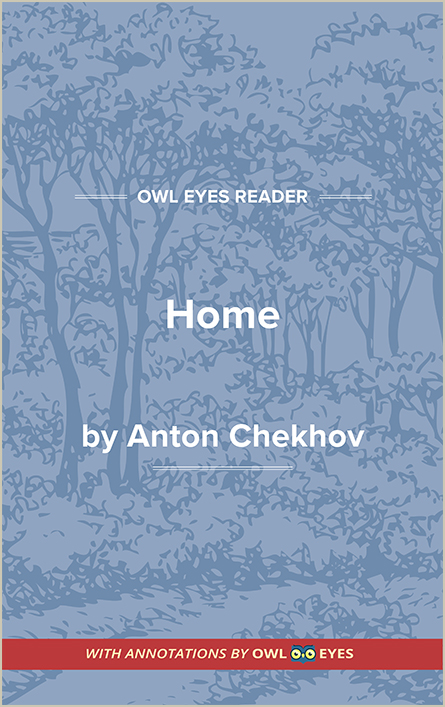Analysis Pages
Themes in Home
Storytelling as Learning: Although “Home” is a relatively short story, it speaks to universal and timeless themes. Through the relationship between father and son, Chekhov explores how we know what we know. He asks us to question how we learn, and to consider whether or not storytelling is a viable method for imparting and acquiring knowledge. At first, Yevgeny is reluctant to trust a method other than the didactic and “crude” ways he has learned. Only after seeing the effects of storytelling on his son, does he realize that storytelling has a purpose beyond entertainment.
Reconciling Logic and Imagination: By the end of the story, Chekhov establishes that knowledge can come from many sources—from laws and codes, as well as folklore and fiction. Logic cannot function without imagination, and imagination cannot function without logic. When facts and figures do not successfully convince Seryozha of the dangers of smoking, Yevgeny turns to fantasy and tells a story. This story is partially rooted in reality, since it is semi-autobiographical, and demonstrates how knowledge can be conveyed as a combination of fact and fiction.
Themes Examples in Home:
Text of the Story
🔒"home..." See in text (Text of the Story)
"And it struck Yevgeny Petrovitch as strange and absurd that he, an experienced advocate, who spent half his life in the practice of reducing people to silence, forestalling what they had to say, and punishing them, was completely at a loss and did not know what to say to the boy...." See in text (Text of the Story)
"That's why no one can take the place of a mother in bringing up a child, because she can feel, cry, and laugh together with the child. One can do nothing by logic and morality. What more shall I say to him? What?"..." See in text (Text of the Story)
"It was between eight and nine o'clock in the evening...." See in text (Text of the Story)
"The living organism has the power of rapidly adapting itself, growing accustomed and inured to any atmosphere whatever, otherwise man would be bound to feel at every moment what an irrational basis there often is underlying his rational activity, and how little of established truth and certainty there is even in work so responsible and so terrible in its effects as that of the teacher, of the lawyer, of the writer. . . ...." See in text (Text of the Story)
"This was probably a law of social life: the less an evil was understood, the more fiercely and coarsely it was attacked...." See in text (Text of the Story)

